|
|
|
Sort Order |
|
|
|
Items / Page
|
|
|
|
|
|
|
| Srl | Item |
| 1 |
ID:
119646


|
|
|
|
|
| Publication |
2013.
|
| Summary/Abstract |
Why do countries open their economies to global capital markets? A number of recent articles have found that two types of factors encourage politicians to liberalize their capital accounts: strong macroeconomic fundamentals and political pressure from proponents of open capital markets. However, these conclusions need to be re-evaluated because the most commonly used measure of capital account openness, Chinn and Ito's (2002) Kaopen index, suffers from systematic measurement error. We modify the Chinn-Ito variable and replicate two studies (Brooks and Kurtz 2007; Chwieroth 2007) to demonstrate that our improved measure overturns some prior findings. Some political variables have stronger effects on capital account policy than previously recognized, while macroeconomic fundamentals are less important than previous research suggests.
|
|
|
|
|
|
|
|
|
|
|
|
|
|
|
|
| 2 |
ID:
119643
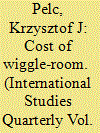

|
|
|
|
|
| Publication |
2013.
|
| Summary/Abstract |
There is considerable variation in the depth of countries' commitments at the World Trade Organization (WTO). While WTO members apply tariffs on imports at roughly comparable levels, the maximum levels allowed on these tariffs vary dramatically, leaving some members with far more flexibility to raise trade barriers overnight. Some countries have argued that such "binding overhang" is harmless unless it is exploited, while other countries disagree. This paper is the first attempt to empirically assess the effect of binding overhang on trade flows. I argue that the mere existence of binding overhang has a strongly negative effect on trade, through the way in which it muddles expectations. Using data at the 4-digit harmonized system product level, covering the WTO membership from 1995 to 2008, I demonstrate that the cost in terms of lost trade resulting from the ability to legally raise a tariff by one point is tantamount to nearly half the cost of having done so. In sum, WTO membership is, by itself, no panacea. Negotiating greater tariff flexibility can water down a country's legal commitments and significantly reduce the benefits flowing from the institution.
|
|
|
|
|
|
|
|
|
|
|
|
|
|
|
|
| 3 |
ID:
119654


|
|
|
|
|
| Publication |
2013.
|
| Summary/Abstract |
The greater peacefulness of jointly democratic pairs of states is an important finding in research on the causes of war. Here, we outline a set of criteria for evaluating critiques of such robust empirical associations and apply them to two recent articles. Mousseau (2013) claims that contract-intensive economies, as proxied by a measure of life insurance expenditure, account for the democratic peace. However, his research suffers from various problems of analysis and interpretation, including a miscoded dependent variable, a misleading specification for dyadic democracy, a suppression of heterogeneous associations, and a heavy dependence on imputation in which greater than 90% of the values of the central independent variable were (improperly) imputed. We estimate 144 specifications that build from Mousseau's models and control for life insurance expenditures, finding substantial, robust support for the democratic peace. Gartzke & Weisiger () claim that the importance of the democratic peace has declined as the proportion of democracies in the international system has increased; but their tests are misspecified and do not address the issue they raise. There are also serious errors in their data. When these problems are corrected, we find that the peacefulness of democratic pairs has actually increased as the proportion of democracies grew after 1816.
|
|
|
|
|
|
|
|
|
|
|
|
|
|
|
|
| 4 |
ID:
119652


|
|
|
|
|
| Publication |
2013.
|
| Summary/Abstract |
Recent studies show that the democratic peace correlation is not significant once the potentially confounding variable that can cause both democracy and peace, contract-intensive economy, is considered; this pattern holds in analyses of wars, fatal militarized interstate conflicts (Mousseau 2009), and interstate crises (Mousseau et al. 2013). These studies rescind the primary evidence for democracy being a cause of the democratic peace and indicate that contract-intensive economy is the more likely explanation for it. This article addresses all recent defenses of the democratic peace correlation, reports results using a new measure of contract flows, and extends the investigation to all militarized interstate conflicts. Analyses of most nations from 1961 to 2001 show that there is no correlation of democracy with peace, and contract-intensive economy is one of the most powerful nontrivial variables in international conflict. The era of the democratic peace appears to be at an end, subsumed by an economic peace.
|
|
|
|
|
|
|
|
|
|
|
|
|
|
|
|
| 5 |
ID:
119635
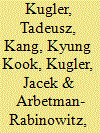

|
|
|
|
|
| Publication |
2013.
|
| Summary/Abstract |
Research on conflict traditionally focuses on its initiation, duration, and severity, but seldom on its consequences. Yet, demographic and economic recovery from the consequences of war lasts far longer and may be more devastating than the waging war. Our concern is with war losses and post-war recovery leading to convergence with pre-war performance. To test this proposition, we choose the most severe international and civil wars after 1920. We find that all belligerents recover or overtake demographic losses incurred in war. Economic assessments differ. The most-developed belligerents recover like a "phoenix" from immense destruction in one generation. For less-developed societies, the outcomes are mixed. The less-developed belligerents recover only a portion of their pre-war performance. The least-developed societies suffer the most and fall into lasting poverty traps. The overlapping generation growth model accounts for such differences in recovery rates based on pre-war performance challenging arguments from Solow's neoclassical growth perspective. Our results imply that foreign aid is incidental to the post-war convergence for the most-developed societies, can prompt recovery for the less-developed societies, and is not effective-unless it is massive and sustained-for the least-developed societies. World War II may provide a poor guide to current post-war challenges in Iraq and in Afghanistan.
|
|
|
|
|
|
|
|
|
|
|
|
|
|
|
|
| 6 |
ID:
119636
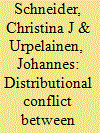

|
|
|
|
|
| Publication |
2013.
|
| Summary/Abstract |
Why do states ratify international treaties? While previous research has emphasized domestic political factors, we focus on power politics in situations in which powerful states disagree on the merits of a treaty. We argue that states supporting the status quo should discourage third parties from ratifying the treaty, whereas challenger states should entice them to do so. Based on this theory, we expect third parties' ratification decisions to be influenced by their dependence on the conflicting states. To test the theory, we use data on the conflict between the United States and the European Union over the regulation of trade in genetically modified organisms. The European Union created a new treaty, the Cartagena Protocol, to enhance biosafety regulation and propagate the "precautionary principle" over the "sound science principle" defended by the United States. Our quantitative analysis shows that ratification decisions of third parties were influenced by relations to and dependence on the clashing giants.
|
|
|
|
|
|
|
|
|
|
|
|
|
|
|
|
| 7 |
ID:
119638


|
|
|
|
|
| Publication |
2013.
|
| Summary/Abstract |
A large body of work within the Europeanization and conditionality literature has examined the European Union's effect on governance quality in Central and Eastern European countries (CEECs). This article aims to contribute to existing work by addressing two questions. First, was the European Union's accession conditionality conducive to better governance in CEECs or was it designed to pick up already committed reformers? Secondly, during which period was the European Union more influential on governance quality in CEECs: accession or membership? To address these questions, we propose a simple model of moral hazard and adverse selection, and draw on survey-based governance quality data to test its predictions. We report that the European Union has offered candidate status to countries that already had better governance quality relative to their peers before 1997. Nonetheless, EU conditionality also had some positive effects on CEEC governance during the accession period, but this effect tended to disappear during the membership period. On the basis of these findings, we argue that the European Union's impact on governance quality in CEECs has to be examined in conjunction with path dependence, and therefore, the perceived risk of "backsliding" requires more detailed analysis.
|
|
|
|
|
|
|
|
|
|
|
|
|
|
|
|
| 8 |
ID:
119649


|
|
|
|
|
| Publication |
2013.
|
| Summary/Abstract |
After a decade of Aid for Trade (AfT) allocations, we can now begin to assess whether this new development strategy has been effective. Focusing on the short-term goal of export growth, we examine whether AfT from the US government promoted exports within recipient national economies over the period 1999-2008. Our results suggest that a $1 dollar increase in total US AfT has been associated with about a $69 increase in recipient exports 2 years later. We also show that the export effect of US AfT has not been confined to the US market and is driven primarily by exports to the rest of the world. In addition, we show that US AfT has been effective in reaching more needy countries as the substantive effect of US aid for trade has been larger in lesser-developed, landlocked, and more distant recipient countries.
|
|
|
|
|
|
|
|
|
|
|
|
|
|
|
|
| 9 |
ID:
119637
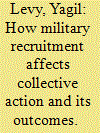

|
|
|
|
|
| Publication |
2013.
|
| Summary/Abstract |
This paper aims to advance the research on the conjunction of two fields-antiwar protest and casualty aversion-by offering a conceptual development of the role of military recruitment in affecting casualty sensitivity-incited antiwar mobilization. Scholars have shown that sensitivity to losses is not a constant variable. Its reflection in the public sphere is affected by variables clustered together as "the politics of war," such as sense of threat, mission success, number of casualties, and elite consensus, which can be mediated by collective actors. However, the role of the mode of military recruitment in influencing collective action in the military realm has been neglected. It is argued that the mode of military recruitment mediates collective actors' ability to leverage the politics of war to challenge dominant discourse and influence war policy, owing to the cumulative impact of four recruitment-related variables: republicanism, social power, the favoring of "voice," and bounded discourse. All shape the movement's framing and resources in a way that affects mobilization.
|
|
|
|
|
|
|
|
|
|
|
|
|
|
|
|
| 10 |
ID:
119645


|
|
|
|
|
| Publication |
2013.
|
| Summary/Abstract |
In the last 15 years, the link between identity and regional institutions has received considerable academic attention, especially from EU scholars. Mostly, their focus has been on the ways in which European institutions affect, constrain, or constitute (or otherwise) state's and individual actor's behavior and identities. By contrast, international relations has been strikingly silent on the question of the identity of regional institutions. However, studying an institution's identity can highlight important aspects of its "quality of life"; not least its ability to interact with other international actors and with its own constituent parts. This article argues that a clear identity is necessary for the organization to project itself internally, internationally, and temporally. The question of institutional identity-and the risks of failing to construct one-is explored by looking at the case of Mercosur, an association which, the article argues, suffers from identity crises in its three main identity dimension: political, economic and external.
|
|
|
|
|
|
|
|
|
|
|
|
|
|
|
|
| 11 |
ID:
119644


|
|
|
|
|
| Publication |
2013.
|
| Summary/Abstract |
This paper analyzes multilateral aid allocation in the European Union (EU). We argue that EU members can influence the aid allocation process toward their national interests if they form powerful coalitions that bias the European Commission's development policies. When EU members' preferences over aid allocation are heterogeneous, the Commission can implement multilateral aid according to its programmatic goals. Greater homogeneity of EU members' goals, however, increases the likelihood that members can form powerful interest coalitions and induce the Commission to allocate aid according to their own national interests. The empirical analysis provides robust support for our theoretical argument, and the findings generally indicate that interest coalitions play an important role in multilateral aid allocation.
|
|
|
|
|
|
|
|
|
|
|
|
|
|
|
|
| 12 |
ID:
119640


|
|
|
|
|
| Publication |
2013.
|
| Summary/Abstract |
Complementing the effectiveness of US sanctions debate, the US government often prods US investors to disinvest from targeted countries, hoping to pressure sanctioned countries to back US foreign policy goals or face economic costs for their actions. Missing from the effectiveness of sanctions debate is the impact US sanctions have on third-party foreign direct investment (FDI). Using panel data for 171 countries from 1969 to 2000, we present the first empirical study on the effect of sanctions on global FDI. We find strong evidence that when US firms disinvest during US sanctions, global FDI significantly increases, providing the target country with a reliable source of capital replacement. The results suggest the limited effectiveness of sanctions for restricting capital flows to targeted countries and that US firms may ultimately bear the highest costs from US-imposed sanctions.
|
|
|
|
|
|
|
|
|
|
|
|
|
|
|
|
| 13 |
ID:
119647


|
|
|
|
|
| Publication |
2013.
|
| Summary/Abstract |
Before 1950, International Relations (IR) was a thoroughly interdisciplinary field. Geographers played a key role in the early development of IR, although they are now little known within the discipline that they helped to found. This article explores the pioneering work of three geographers in IR-Isaiah Bowman, Halford J. Mackinder and Derwent Whittlesey-and sets out to reclaim a lost chapter in the history of IR that questions the tendency to reduce IR to a conflict between realism and idealism.
|
|
|
|
|
|
|
|
|
|
|
|
|
|
|
|
| 14 |
ID:
119642
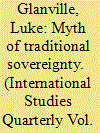

|
|
|
|
|
| Publication |
2013.
|
| Summary/Abstract |
The conventional story of sovereignty told in the discipline of International Relations (IR) tells us that there is a "traditional" or "Westphalian" meaning of sovereignty that has prevailed since the seventeenth century and that accords states the right to govern themselves free from outside interference. In recent years, the tale goes, this meaning has been challenged for the first time by notions of conditional and responsible sovereignty. This article argues that the supposed "traditional" meaning of sovereignty is not as foundational and timeless as is often assumed. Rather than a right of non-intervention, it was the right to wage (just) war that was first conceived by political theorists to be the external corollary of the internal supremacy of the sovereign. This included the right of war to punish tyranny and rescue the oppressed. This article examines the initial absence and then the gradual emergence of the "traditional" meaning of sovereignty, arguing that it was only firmly established by international society for the first time in the twentieth century. It concludes by considering some of the implications of this revised story of sovereignty for the study of IR.
|
|
|
|
|
|
|
|
|
|
|
|
|
|
|
|
| 15 |
ID:
119650


|
|
|
|
|
| Publication |
2013.
|
| Summary/Abstract |
Perhaps the simplest explanation for where fault lines lie in a political process involves the presence of an "other." Difference divides and similarity unites. These similarities and differences can in turn orient and propagate conflict. Yet, similarity and difference are also dynamic, evolving in response to changing population characteristics or a new reference point. We offer a simple explanation for interstate conflict in which the salience of similarity or difference varies with the prevalence or capabilities of groups. We apply our argument in the context of the democratic peace. When democracies are scarce or weak, and autocracies plentiful and powerful, democracies face a common threat. As the democratic community strengthens, however, the threat from autocracies declines and differences among democracies appear more salient. Our findings contrast with standard expectations about how democratization shapes world affairs.
|
|
|
|
|
|
|
|
|
|
|
|
|
|
|
|
| 16 |
ID:
119648


|
|
|
|
|
| Publication |
2013.
|
| Summary/Abstract |
This article draws attention to some surprising similarities between the recent political trajectories of Turkey and Thailand in order to argue that international norms strongly shape domestic cleavage formations. The timing and the manner of incorporation of particular states into the international system affects not only their political and economic development, but also the way various domestic groups see their mission, their identity, and their opposition. In both Turkey and Thailand, what development has brought is neither the opposition between traditional status groups and the market generated social forces, nor the tradition/religion-based opposition to modernization and democracy that is typically assumed to mark developing societies. What we find in both cases instead is a modernization-generated statist/bureaucratic social middle class that justifies its skepticism of democratization on the basis of norms upheld by the international society itself.
|
|
|
|
|
|
|
|
|
|
|
|
|
|
|
|
| 17 |
ID:
119639
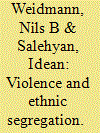

|
|
|
|
|
| Publication |
2013.
|
| Summary/Abstract |
The implementation of the United States military surge in Iraq coincided with a significant reduction in ethnic violence. Two explanations have been proposed for this result: The first is that the troop surge worked by increasing counterinsurgent capacity, whereas the second argument is that ethnic unmixing and the establishment of relatively homogenous enclaves were responsible for declining violence in Baghdad through reducing contact. We address this question using an agent-based model that is built on GIS-coded data on violence and ethnic composition in Baghdad. While we cannot fully resolve the debate about the effectiveness of the surge, our model shows that patterns of violence and segregation in Baghdad are consistent with a simple mechanism of ethnically motivated attacks and subsequent migration. Our modeling exercise also informs current debates about the effectiveness of counterinsurgency operations. We implement a simple policing mechanism in our model and show that even small levels of policing can dramatically mitigate subsequent levels of violence. However, our results also show that the timing of these efforts is crucial; early responses to ethnic violence are highly effective, but quickly lose impact as their implementation is delayed.
|
|
|
|
|
|
|
|
|
|
|
|
|
|
|
|
| 18 |
ID:
119653


|
|
|
|
|
| Publication |
2013.
|
| Summary/Abstract |
Gartzke and Weisiger emphasize the pacifying impact of regime similarity. But the logic of their argument makes it seem unlikely that shared autocracy and democracy have equal pacifying impacts, because autocracies are so much more diverse. Regime similarity is in any case a problematic control variable. Since joint democracy and regime similarity are related by definition, any confounding impact regime similarity appears to have is produced in part by conceptual overlap rather than by a causal connection. Finally, even democratic states with diverse preferences might maintain peaceful relationships, because of their ability to make credible commitments and their respect for each other's determination or prowess as war fighters. Mousseau claims that contract intensity confounds the relationship between democracy and peace, but to the extent that democracy makes contract intensity more likely, contract intensity cannot be a confounding variable. Data on life insurance in force before 1940 suggest that contract-intensive states fought each other in World Wars I and II. Mousseau claims that contract intensity creates pacifying economic interdependence. But life insurance contracts provide unnecessarily limited information regarding the interactions among states that lead to interdependence. In short, neither of these articles creates serious doubts about the pacifying impact of shared democracy.
|
|
|
|
|
|
|
|
|
|
|
|
|
|
|
|
|
|
|
|
|